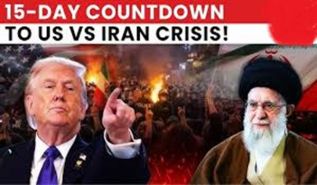بسم الله الرحمن الرحيم
Rising Political Tensions Between Brazil and America
(Translated)
Al-Rayah Newspaper - Issue 568 - 08/10/2025 CE
By: Ustadh Yasser Abu Khalil – Brazil
Donald Trump’s return to power in the United States marked an important turning point in the relationship between the U.S. and Brazil. This shift became especially clear through a series of events related to internal conflicts between powerful groups in Brazil, where the Trump administration openly supported one side over the other.
Historically, Brazil’s military has had strong influence over the country’s politics and has often followed the lead of the current U.S. administration, just like in many other Latin American countries. However, during Trump’s first term as president, something new happened. He gained loyal supporters in Brazil, including people in politics and the military.
These Trump-aligned Brazilians became involved in a plan to stop the election result that brought President Luiz Inácio Lula da Silva back to power, a result supported by the new U.S. administration under Joe Biden. However, many top military leaders in Brazil, who traditionally follow the official U.S. position, refused to support the plan. Some of them were even shown details of the coup attempt in advance but chose not to join. Instead, they helped expose the plan and provided evidence against those involved.
This created a deep split within the Brazilian military, with growing hostility between the two sides. While Biden remained in power, the pro-coup group could not gain full control, and matters stayed under control.
However, when Trump returned to power, the situation changed dramatically. His supporters in Brazil felt empowered again. They began pushing in Brazil’s Congresso Nacional (National Congress) to pass a law that would give a full pardon to everyone involved in the failed coup and to permanently close the case.
The Brazilian government had two choices: either wait and see what Trump’s allies would do once he returned to power, possibly expecting revenge, or defend itself and take strong action against the pro-coup group. This explains why the state suddenly launched serious investigations and began arresting top military officers, something that had never happened before in Brazil, and who were previously considered untouchable. Even though the government had the evidence to arrest them for two years, it claimed otherwise until now.
This also explains the events that followed. For example, the U.S. suddenly raised tariffs, taxes on imported goods, by 50% on Brazilian products, especially steel and aluminum, saying it was to protect American industry. However, these new tariffs weren’t just about economics, they were clearly political. It was the biggest increase in import taxes on any country, and it looked like the U.S. was using this move to pressure Brazil’s leaders.
The U.S. also used its influence in international organizations to pressure Brazil on other issues, like environmental concerns and climate change. Brazil faced strong criticism for the worsening condition of the Amazon rainforest, which is a politically sensitive issue that the U.S. used as a tool for pressure.
Then came official U.S. statements criticizing Brazil’s judiciary and its presidential elections. Sanctions were even placed on top legal officials, including Supreme Court Justice Alexandre de Moraes.
In response, Brazil took a strong stand. It firmly rejected U.S. interference in its judicial decisions, worked to strengthen its local and regional economy, especially through the Mercosur (Southern Common Market) trade bloc, and began looking for new markets to replace the American one. The government also supported local producers hurt by the tariffs, and insisted on national sovereignty. This strong stance increased public support for President Lula da Silva.
As a result, more and more people started demanding that former president Jair Bolsonaro be put on trial and sent to prison for his role in the coup attempt. This actually happened, a historic first in Brazil, with the arrest of a former president for trying to overthrow the government.
This situation has made things even more difficult for the United States in Brazil. Challenging the military openly, especially when it goes against official U.S. policy, can have serious consequences. In fact, because of America’s arrogant approach, it ended up indirectly helping the progressive left in Brazil gain support within the military, since both sides shared a common goal, protecting themselves from possible revenge by Trump and Bolsonaro’s supporters.
On top of that, Brazil has dared to officially seek new trade partners outside of the U.S., like China and the European Union. Brazil’s bold political stances have also become clearer. For example, President Lula’s repeated statements describing what “Israel” is doing in Gaza as a “holocaust,” and Brazil’s open support for Gaza, show a growing political independence. Brazil even excluded the U.S. from participating in the second “In Defense of Democracy: Fighting Against Extremism” held at the UN General Assembly, which is another sign of Brazil pushing back against U.S. dominance and arrogance.
Due to Brazil’s firm stance, its unity between the government, the courts, and military leaders who fear Trump’s return, and the growing loss of public trust in Bolsonaro’s Trump-aligned supporters, the “Bolsonaristas,” Trump now seems to be changing his approach. He recently tried to appear friendly toward President Lula, despite years of tension, and even hostility between the two countries. During a brief 20-second encounter at the UN General Assembly in New York, Trump made exaggerated comments about having great chemistry and admiration for Lula.
Lula responded positively to Trump’s gesture. In reality, any deal or improvement in relations between the U.S. and Brazil at this point would benefit Brazil, at least partly, as long as Brazil doesn’t compromise on its legal process and continues its efforts to end the influence of the Bolsonaro–Trump alliance.




